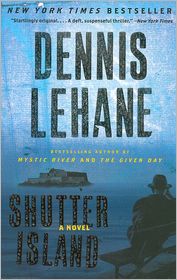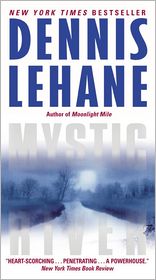21 Things We Learned at the Dennis Lehane #BNAuthorEvent
 Dennis Lehane, author of Mystic River, Gone Baby Gone, and Shutter Island, as well as writer for The Wire and Boardwalk Empire, dropped by the Barnes & Noble on the Upper East Side in Manhattan on Tuesday, March 10. He opened by saying, “it’s raining, and you came out for me. I would not have come out for me.” If Lehane has a blasé attitude about himself, his fans do not. They were delighted to hear him read from his new book, World Gone By, and answer questions about writing, reading, and Boston (his city, dammit!). Here are 21 things we learned about the celebrated author.
Dennis Lehane, author of Mystic River, Gone Baby Gone, and Shutter Island, as well as writer for The Wire and Boardwalk Empire, dropped by the Barnes & Noble on the Upper East Side in Manhattan on Tuesday, March 10. He opened by saying, “it’s raining, and you came out for me. I would not have come out for me.” If Lehane has a blasé attitude about himself, his fans do not. They were delighted to hear him read from his new book, World Gone By, and answer questions about writing, reading, and Boston (his city, dammit!). Here are 21 things we learned about the celebrated author.
Dennis Lehane started writing when he was eight. “But it was not a viable career option in Dorchester, Massachusetts.”
He dropped out of two colleges. “The second time, I realized that I suck at everything with the exception of making stuff up.” So he became a writer. “My father didn’t even know what creative writing was. He was like, ‘what the hell is creative writing?’”
He thinks you’re likely to succeed if you don’t have a safety net. “I was the only guy I knew who couldn’t fail. I didn’t want to be back bartending [after failing at being a writer] having all the guys in the bar saying, ‘Hey, Steinbeck. Get me another beer.’ I didn’t want to be eating sh*t the rest of my life.”
World Gone By
World Gone By
In Stock Online
eBook $14.99
His kids and family help him balance his work/home life. “I have two little girls and a lovely, wonderful, perfect wife who actually expects me to be present. So I punch in at seven and I shut down at four.”
He brings a buddy to work. “I take my insane dog into work with me. We go to work together.”
He doesn’t suggest writing for more than four hours at a time. “After four hours you start getting stuff you have to rewrite.”
“My inspiration for Shutter Island was whiskey. Also my love of B movies, and my love of gothic stuff.”
Shutter Island came to him in one night. “It came to me in not a dream, but a mental break. My mother was sick. Someone I knew had just died. The whole thing came unfurling in the middle of the night. I went to the kitchen and wrote it all down and went to bed. The next day I couldn’t remember writing it. ‘I’m not that smart,’ I thought. I must have triggered an extra part of my brain. When a book is handed to you, you write it.”
His heart will always be in Boston. “I tell people I live in L.A., but I’m from Boston. I don’t hate L.A. It’s the best I can say. But I feel like Keanu in The Matrix. I know something is wrong, but I can’t put my finger on it.”
His kids and family help him balance his work/home life. “I have two little girls and a lovely, wonderful, perfect wife who actually expects me to be present. So I punch in at seven and I shut down at four.”
He brings a buddy to work. “I take my insane dog into work with me. We go to work together.”
He doesn’t suggest writing for more than four hours at a time. “After four hours you start getting stuff you have to rewrite.”
“My inspiration for Shutter Island was whiskey. Also my love of B movies, and my love of gothic stuff.”
Shutter Island came to him in one night. “It came to me in not a dream, but a mental break. My mother was sick. Someone I knew had just died. The whole thing came unfurling in the middle of the night. I went to the kitchen and wrote it all down and went to bed. The next day I couldn’t remember writing it. ‘I’m not that smart,’ I thought. I must have triggered an extra part of my brain. When a book is handed to you, you write it.”
His heart will always be in Boston. “I tell people I live in L.A., but I’m from Boston. I don’t hate L.A. It’s the best I can say. But I feel like Keanu in The Matrix. I know something is wrong, but I can’t put my finger on it.”
Shutter Island
Shutter Island
Paperback $16.99
After writing World Gone By (a book set in Tampa, Florida), he’ll never write another book that doesn’t take place in Boston. “It’s my city, dammit.”
He wrote World Gone By because he wanted to write a book about consequence. “It’s about middle age and mortality. This is my book meditating on a lot of loss.”
He likes to write about gangsters because they have no self-awareness. “My favorite line is, ‘The truest thing (Joe) knew about power was that by the time you realize you are losing it, it’s already gone.’”
He wrote the short story Until Gwen in a pinch, during a storm. “My friend commissioned a story from me and said, ‘where’s my story?’ I said, ‘When’s it due?’ He said, ‘It was due three months ago.’ I said, ‘I’ll see what I can do.’ I had been carrying around this one sentence literally in my pocket since grad school. ‘Your father picks you up from prison…’ and then I wrote the next sentence. Then I wrote the next sentence. I wrote from 8 PM to 4 AM. I wrote that whole story in one night, then rewrote it the next day in second person. I think it had something to do with the lightning.”
His tip for writers: give the character something to want. “If the character wants something, the audience will follow.”
The problem with books is that everyone thinks they can write one. “We can all tell a story. We can all write a sentence. But saying you can roll out of bed and write a book is like saying you can roll out of bed and write a screenplay. It’s just as hard to complete.”
After writing World Gone By (a book set in Tampa, Florida), he’ll never write another book that doesn’t take place in Boston. “It’s my city, dammit.”
He wrote World Gone By because he wanted to write a book about consequence. “It’s about middle age and mortality. This is my book meditating on a lot of loss.”
He likes to write about gangsters because they have no self-awareness. “My favorite line is, ‘The truest thing (Joe) knew about power was that by the time you realize you are losing it, it’s already gone.’”
He wrote the short story Until Gwen in a pinch, during a storm. “My friend commissioned a story from me and said, ‘where’s my story?’ I said, ‘When’s it due?’ He said, ‘It was due three months ago.’ I said, ‘I’ll see what I can do.’ I had been carrying around this one sentence literally in my pocket since grad school. ‘Your father picks you up from prison…’ and then I wrote the next sentence. Then I wrote the next sentence. I wrote from 8 PM to 4 AM. I wrote that whole story in one night, then rewrote it the next day in second person. I think it had something to do with the lightning.”
His tip for writers: give the character something to want. “If the character wants something, the audience will follow.”
The problem with books is that everyone thinks they can write one. “We can all tell a story. We can all write a sentence. But saying you can roll out of bed and write a book is like saying you can roll out of bed and write a screenplay. It’s just as hard to complete.”
Mystic River
Mystic River
In Stock Online
Paperback $9.99
Older writers struggle with time. “They have ticking clock disease. They want shortcuts. They think they’re running out of time. It really does take that 10,000 hours until you know what you’re doing.”
“Good writing whispers. Bad writing shouts.”
He usually knows three major things about the story before he begins writing: The beginning, something to move forward to, and something that happens at the end. “But when you get to the end, you realize it was never supposed to end that way.”
He’s a Richard Price fan. “The Wanderers changed my life. It was the first time I recognized people in a book. I thought, ‘If Price can do it, I can do it.’”
Suggested reading for writers: Writing Fiction, by Janet Burroway, and On Moral Fiction, by John Gardner.
“A good writer makes you feel like you’re coming home. That’s who you emulate.”
Older writers struggle with time. “They have ticking clock disease. They want shortcuts. They think they’re running out of time. It really does take that 10,000 hours until you know what you’re doing.”
“Good writing whispers. Bad writing shouts.”
He usually knows three major things about the story before he begins writing: The beginning, something to move forward to, and something that happens at the end. “But when you get to the end, you realize it was never supposed to end that way.”
He’s a Richard Price fan. “The Wanderers changed my life. It was the first time I recognized people in a book. I thought, ‘If Price can do it, I can do it.’”
Suggested reading for writers: Writing Fiction, by Janet Burroway, and On Moral Fiction, by John Gardner.
“A good writer makes you feel like you’re coming home. That’s who you emulate.”


